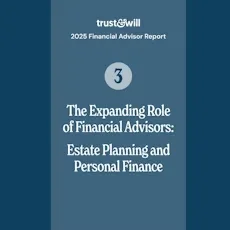
The Expanding Role of Financial Advisors: Estate Planning & Personal Finance
Clients want more than investment advice—they want estate planning support. Learn why holistic guidance is the new standard for financial advisors.

By Staff Writer
Trust & Will
Financial advisors have long been viewed as investment strategists, but today’s clients expect far more than portfolio management. They are looking for holistic guidance that considers their full financial picture—including estate planning.
This demand isn’t just about planning for the future; it’s about easing financial anxiety in the present. According to Trust & Will’s 2025 Annual Estate Planning Report, financial anxiety is at an all-time high, with 49% of Americans saying they are more concerned about their financial future than they were last year. Clients are looking to their financial advisors not just to grow their wealth, but to provide security, peace of mind, and long-term financial stability.
The Role Financial Advisors Already Play
While some may see estate planning as the domain of attorneys, the reality is that financial advisors already have deep insight into their clients’ personal and financial lives.
When asked how much personal information they share with their financial advisor:
43% of clients said they share details about family dynamics that impact their finances.
39% keep discussions strictly financial.
18% disclose everything—even private or sensitive family matters.
This suggests that financial advisors often serve as trusted confidants—far beyond just handling investments. Many clients are already opening up about their family structure, wealth transfer concerns, and long-term financial goals—all of which are directly tied to estate planning.

What Clients Expect from Their Financial Advisor in Estate Planning
The data also reveals that clients don’t just want advice about estate planning; they want active support.
When asked what role they think their financial advisor should play in estate planning:
41% want help with specific tasks like beneficiary designations and tax strategies.
37% expect their advisor to educate them on estate planning basics.
35% want a full suite of estate planning services, including document drafting.
33% want proactive reminders to update their estate plan.
32% want their advisor to collaborate with estate planning attorneys.
The message is clear: Clients don’t see estate planning as separate from their financial lives—they expect their financial advisor to help guide them through it.

Generational & Demographic Trends
While demand for estate planning integration is widespread, Millennials are leading the charge. They were above average in nearly every category, showing a clear preference for a collaborative and hands-on approach to estate planning.
In contrast, Gen Z was the most likely to keep financial conversations strictly investment-focused (57%)—suggesting that younger clients may need more education on the benefits of estate planning.
Women also stood out, as they were more likely than men to want full estate planning services and proactive reminders. This highlights an opportunity for advisors to better engage female clients by offering more structured estate planning discussions.
The Advisor’s Advantage: Strengthening Client Relationships & Retention
For financial advisors, embracing estate planning isn’t just about offering an additional service—it’s about strengthening client relationships and increasing retention.
Consider this:
Clients who see their advisor as a holistic planner are more likely to remain long-term clients.
Advisors who integrate estate planning can differentiate themselves in an increasingly competitive industry.
Providing estate planning support helps ease financial anxiety—something nearly half of Americans are experiencing today.
In short, estate planning presents a powerful opportunity for financial advisors to position themselves as trusted, long-term partners in their clients’ financial lives.

These insights were unveiled in the Trust & Will 2025 Annual Financial Advisor Report. Click here to view the full report.
Trust & Will is an online service providing legal forms and information. We are not a law firm and we do not provide legal advice.
Last updated: October 26, 2025



